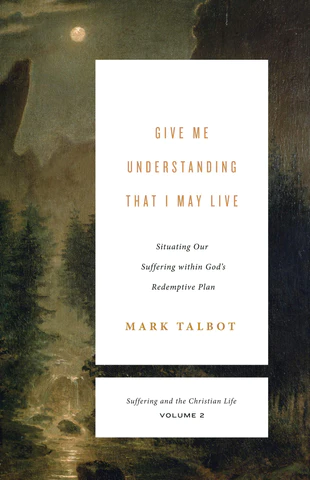
Mark Talbot
Reviewed by: James H. Berry
Give Me Understanding That I May Live: Situating Our Suffering Within God’s Redemptive Plan, by Mark Talbot. Crossway, 2022. Paperback, 240 pages, $21.99. Reviewed by OP ruling elder James H. Berry.
The author of Give Me Understanding That I May Live: Situating Our Suffering within God’s Redemptive Plan is well acquainted with his topic, and not merely academically—Professor Talbot knows suffering. At the age of seventeen, he suffered an accident that left him paralyzed. Facing a lifetime of such irreparable physical brokenness, questions about God surfaced. How can a good god let this happen to me? Does God really love me? The premise behind such questions is that a loving, powerful, and good god does not permit or author suffering. Talbot’s interaction with this premise is both pastoral and biblical-theological: he situates suffering in light of Scripture’s story.
This is the second installment in what will be a four-volume series. The first volume, When the Stars Disappear: Help and Hope from Stories of Suffering in Scripture, encouraged the framing of personal trials in light of particular biblical characters who endured great suffering. Biblical saints bear witness to the hand of God amid terrible distress, working all things for the good of his people and for his glory. These examples encourage faith and perseverance when it appears that chaos, darkness, and emptiness are all that exist. The current volume takes a broader tack by using the unfolding story of Scripture to explain why suffering exists and to present a future without suffering in Glory. Talbot recognizes suffering’s tyrannical tendency to fixate on the immediate pain, often resulting in the sufferer unhealthily identifying the suffering as core to who they are: “I am suffering.” The biblical story focuses on that which is universal, purposeful, and eschatological, allowing all manner of suffering to be experienced without defining the sufferer. Rather, the suffering is defined and valued by God, is shared by his saints, and is not all that is.
The book has four chapters, three of which examine divisions of biblical history: creation, rebellion, redemption, and consummation. A fourth chapter is devoted to answering, “What is suffering?” and, “How does it affect us?” In creation, God made all things good and harmonious—his perfect design, perfectly implemented. In rebellion, sin destroys this perfect unity, tragically giving birth to the alien element of suffering. Creatures are now in disunion and discord with themselves, creation, and God. Eve blames Adam. Adam blames God. Love turns to hate. Life is now painful. In his love, God has not left humankind in the estate of sin and misery, but has offered redemption through the suffering of his Son. Through Christ’s sacrifice, our lives are renewed, and creation is restored to perfection. This perfection is not immediate but awaits full consummation on the last day, which creates both the edge and opportunity of suffering. In its cutting, suffering teaches that life is not as it should be and invites us to call out to God both in lament for what was lost and in longing for what is to come.
Overall, this book is accessible, offers a useful introduction to the biblical story, and provides context for suffering. The prologue is a helpful guide on how to read and make use of the material. The epilogue is a fine apologetic for the importance of story and calls us to embrace the grand narrative of all things, of which suffering is only a minor plot. The footnotes present opportunity to study concepts and Scripture more fully.
In sum, the book was edifying and engaging. However, it seemed that too much was left unsaid. How do we live in a world of suffering? How does the resurrection redeem life now as opposed to the life to come? The biblical story centers on the person of Christ—how is suffering worked out today in his body and bride, the church? Attention could have been given to the vital importance of the means of grace to endure this current darkness and rise above. There are two more volumes yet to be published. My hope is Professor Talbot will use his compassionate skill to lead us in a greater exploration of these themes.
December 14, 2025
December 07, 2025
November 30, 2025
November 23, 2025
November 16, 2025
November 09, 2025
November 02, 2025
© 2025 The Orthodox Presbyterian Church